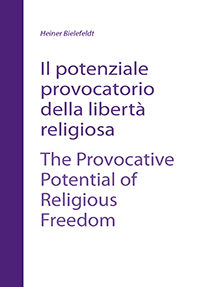Il potenziale provocatorio della libertà religiosa | The Provocative Potential of Religious Freedom
Heiner Bielefeldt

Numero: 3
Editore: FBK Press
Città: Trento
Anno: 2017
Pagine: 60
Cartaceo
| ISBN: | 978-88-98989-31-7 |
E-book
| ISBN: | 978-88-98989-32-4 |
Libro
Se la libertà di «scelta» rappresenta una componente giuridica indispensabile all’interno della libertà religiosa o di credo, ciò non implica la mercificazione neoliberale della religione come fosse un qualsiasi articolo in vendita nel mercato globale del benessere. Il riconoscimento che la libertà di religione o di credo accorda ai bisogni profondi ed esistenziali delle persone non pone alcuna minaccia alle società aperte, liberali – è vero l’opposto.
Indice
Presentazione
Il potenziale provocatorio della libertà religiosa
Profilo biografico
Principali pubblicazioni
Autori
Heiner Bielefeldt è nato nel 1958 nei pressi di Aquisgrana, in Germania. Ha studiato filosofia, teologia cattolica e storia presso le Università di Bonn e di Tübingen. Nel 1989 si è addottorato con una tesi sulle teorie del contratto sociale (Hobbes, Locke, Rousseau, Kant, Rawls) e sul loro impatto sulla teoria costituzionale contemporanea. Nel 2000 ha conseguito il diploma di abilitazione all’Università di Brema con una tesi sulla filosofia dei diritti umani.
Ha insegnato presso le Università di Mannheim, Heidelberg, Toronto e Bielefeld, occupandosi delle problematiche inerenti ai diritti umani non solo come accademico ma anche come attivista. Tra il 2003 e il 2009 ha diretto il Deutsches Institut für Menschenrechte a Berlino, l’istituzione tedesca ufficialmente accredita per i diritti umani.
Nel 2009 ha assunto la cattedra di Diritti umani e politica dei diritti umani presso l’Università di Erlangen-Nürnberg. Dal 2010 è Relatore Speciale delle Nazioni Unite per la libertà di religione o di credo, con un mandato a livello mondiale. In questa veste ha effettuato ispezioni in diversi Paesi e presentato rapporti a vari consessi delle Nazioni Unite. Nel novembre 2014 è stato insignito della laurea honoris causa in Teologia dalla Facoltà di Teologia cattolica dell’Università di Lucerna.
Dal settembre 2016 è inoltre professore associato presso il Centro per i Diritti Umani di Oslo. Gli interessi di ricerca di Bielefeldt riguardano la teoria e la pratica dei diritti umani da più prospettive disciplinari, con una particolare focalizzazione sulla libertà religiosa o di credo.

